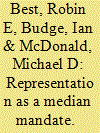| Srl | Item |
| 1 |
ID:
004526


|
|
|
|
|
| Publication |
London, Sage Publications, 1994.
|
| Description |
v, 346p.,tables
|
| Standard Number |
0803988427
|
|
|
|
|
|
|
|
|
|
|
|
Copies: C:1/I:0,R:0,Q:0
Circulation
| Accession# | Call# | Current Location | Status | Policy | Location |
| 035335 | 321.8/BUD 035335 | Main | On Shelf | General | |
|
|
|
|
| 2 |
ID:
111497


|
|
|
|
|
| Publication |
2012.
|
| Summary/Abstract |
The extent and ways in which popular preferences influence government policy are absolutely central to our understanding of modern democracy. Paul Warwick's discussion of these in the European Journal of Political Research in 2010 puts itself at the heart of the debate with its critique of the median mandate theory of McDonald and Budge, proposing an alternative 'bilateralist' concept of representation. This article questions whether this concept has much to add to our theoretical understanding of representational processes. However, Warwick's further conceptual points deserve serious consideration. These concern the time horizons within which representative processes work, and the status of the median position given multi-motivated voting. At the evidential level, Warwick argues that survey-based measures of voter and party left-right positions fail to produce the correspondence between median and government policy positions that median mandate theory would have us expect. However, survey-based measures of median voter and party placements obscure important cross-national variation. Using the Comparative Study of Electoral Systems (CSES 2007), as Warwick does, this article shows that survey respondents norm their own and their country's party positions to their national context. The consequence is to make the political centre in all nations appear similar. Allowing for the relevant cross-national differences brings the relationship between the median voter and government position back in line with expectations.
|
|
|
|
|
|
|
|
|
|
|
|
|
|
|
|